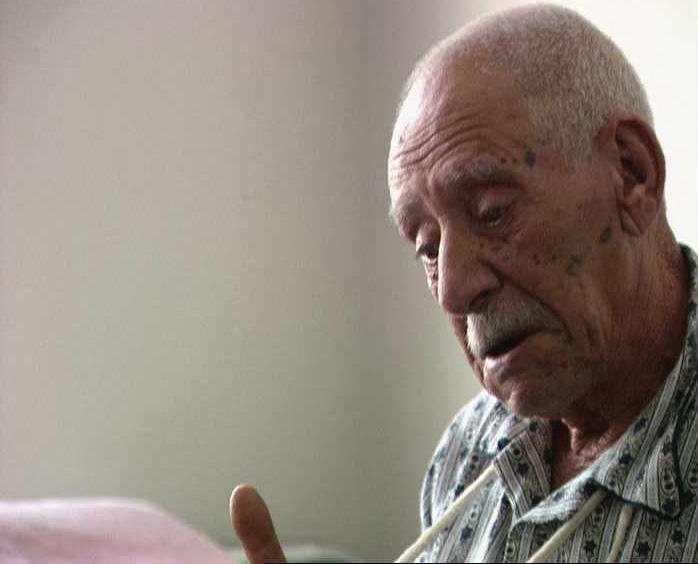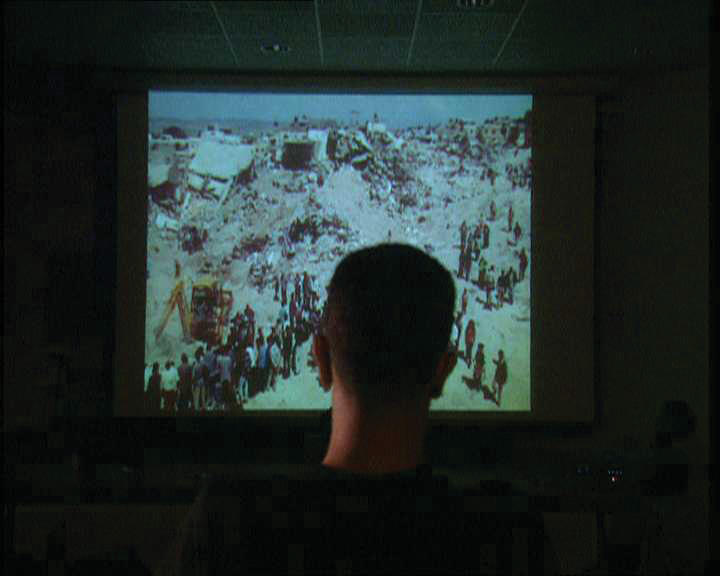
Yuval’s body language speaks volumes. The Israeli soldier stares ahead, clearing his throat; his jaw is tense, his hands clenched in his lap. “If I don’t do it, someone else will. These things must be done,” he says, attempting to explain his role in bulldozing Palestinian houses during the siege of Jenin and parts of Nablus in March 2003. The camp’s 14,000 residents — around 500 of them armed with weapons ranging from British World War I guns to pistols and kalashnikovs, the rest relying on homemade mines — held off the Israeli army for 12–15 days.
Palestinian director Nizar Hassan’s potent documentary flits between a cinema, where Hassan discusses footage of the destruction of the camp with Yuval, and the camp itself, where he interviews Palestinian survivors. It’s a neat premise and one that works; Ejteyah depicts the devastating detail of everyday Israeli aggression.
Western audiences may well be shocked by the vitriolic and wanton destruction inflicted by the invading forces. “Thank you for your warm hospitality see you at the peace talks” reads the graffiti scrawled in Hebrew on a grandmother’s bedroom mirror. The Star of David — once such a potent symbol of victimhood — has become an emblem of invasion, plastered everywhere from public walls to private homes. Hassan brings home the terrible mundanity of war: how homes are commandeered as a base for snipers; how Israelis, working 24-hour shifts in their D-9 bulldozers, deposit their bodily waste in newspaper and bottles.
Euphemisms abound: Yuval talks of “preparing a workspace” and “opening up streets” as the camera focuses in on piles of rubble or houses left naked by missing walls. Around 200 apartments were demolished and another 300 made uninhabitable.
Hassan knows when to push his interviewees, when to flit uneasily using DV, and when to let silence reign. As a young mother returns to her home a few days after the soldiers have left, Hassan simply lets the camera slowly pan the smashed possessions, settling on her still, stony face, squashed with emotion. Speaking to the soldier in the cinema, he pauses the tape and gently, in Hebrew, pushes him to question his role. “If you want to fight the Israelis, then it’s necessary to portray them as human beings,” Hassan told Bidoun.
“The Palestinians in Jenin were talked about as being heroic for the first 15 days, then as a massacre,” the director continued. “This didn’t make sense. At the end of the day it was simply resistance. A minor part of resistance is military, the rest is human, and this spirit of resistance, of people protecting their dreams, defeated the Israelis — they left in a spirit of defeat.”
Ejteyah had its debut in Jenin last year, projected against the last remaining house in that camp’s “Ground Zero” to an audience of over 10,000. “Every single day the Israelis occupy and kill, but to defeat them we must defeat the ideology [of occupation],” says Hassan. “Film is the medium with which we fight.”
Ejteyah (Invasion), 2003. Directed by Nizar Hassan (Palestine) Documentary. 60 min.
